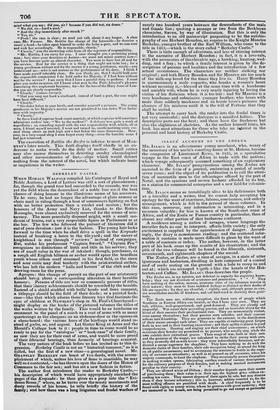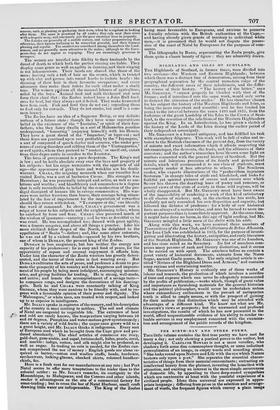ISAACS' ACCOUNT OF THE. ZOOLIJS.
MR. ISAACS is an adventurous young merchant, who, weary of the monotony of his uncle's counting-house at St. Helena, became the companion of Lieutenant KING, in 1825, in a speculative voyage to the East coast of Africa to trade with the natives; which voyage subsequently assumed something of an exploratory character. Mr. Iss.Acs' peregrinations among the Zoolus are narrated in the form of a journal, embracing a period of nearly seven years; and the object of its publication is to call the atten- tion of mercantile men to the advantages offered by the port of Natal, and the spacious and secure harbour afforded by its bay, as a station for commercial enterprise and a new field for coloniza- tion.
Mr. ISAACS seems so tremblingly alive to his deficiencies both as a traveller and a writer, that we cannot help accepting his apology for the want of exactness, fulness, conciseness, and orderly arrangement, which is felt in the perusal of these volumes. In this case, moreover, any information is interesting, and in a measure valuable; for less is known of the South-east coast of Africa, and of the Zoolu or Fuanos country in particular, than of almost any other portion of that barbarous continent. A residence among a nation of savages, whose language the traveller finds no one to interpret, affords little variety ; the only excitement is supplied by the apprehension of danger. Accord- ingly, the diary is monotonous reading; and the scattered infor- mation it contains is made more difficult to glean by the want of a table of contents or index. The author, however, in the latter part of his book sums up the results of his observation; and the pith of the two volumes will be found in the fifteenth, sixteenth, seventeenth, and eighteenth chapters of the second. The Zoolus, or Zoolas, are a race of savages, in a state of utter ignorance and barbarism, dwelling in huts composed of a conical roof of reeds resting on the ground with a hole to creep in and out at ; which are arranged togeth :r like the kraals of the Hot- tentots and Caffres. Mr. IsAAcs thus describes the people.
The Zoolas are, in my opinion, not deficient in capacity for acquiring know- ledge; they are not destitute of acuteness and penetration. • * • They have nothing of the sullen, morose, atrocious vices of the inhuman warrior in their nature ; they seem to have imbibed feelings as distinct as their :bodes of life are opposite ; for they are cheerful, rightly, and, although prone to vice, are nevertheless sensible of kindness, and hot backward in showing their grati- tude.
The Zuola men are, without exception, the finest race of people which Southern or Eastern Africa can furnish, or that I have ever seen. They are tall, athletic, well-proportioned, and good-featured. They are cleanly and respectful. War seems their prevailing passion, and an insatiable thirst for the blood of their enemies their predominant vice. They are momentarily violent, even among themselves; but their passion soon subsides, and their rancour softens into friendship. They arc generous in the extreme in the distribution of their means amongst each other. They are capable of enduring great fatigue both in war and in their hunting excursions ; and their agility is almost beyond comprehension. Dancing and singing are their chief amusements ; on which occasions their females are permitted to be present, who usually sing while the men exhibit their attitudinal graces. Their songs of war, both in their note and the gestures of the singer, are calculated to strike their enemy with awe, as they avowedly did us with terror: they were indescribably ferocious, and
in- dicated a savage eagerness for slaughter. They have nothing to do with the domestic duties of their families, their sole occupation being to attend the king on all public amusements, and to accompany the warriors to battle in the capa- city of servants or attendants; as well as to proceed on all occasions, when his majesty commands, to hunt the elephant. They occasionally amuse themselves in making wooden spoons, fabricating earthen vessels of various descriptions, for the culinary purposes of their females, and in making musical instruments peculiar to their country. * * • •
They are allowed wives ad libitum ; their number depends upon their means of purchasing them ; their value is in their age, the highest price seldom ex- ceeding ten cows. They cannot dispose of them again by sale, but may dismiss them if they become refractory ; this is, however, seldom resorted to, for the most trifling offences are punished with death. A chief frequently is to be found with eighty or ninety wives, whom he governs with great austerity ; they are immured in his kraals, not being permitted to go out except at particular
seasons, such as planting or gathering their corn, when he is vigilant in looking after them. The same is practised by all ranks; they rule over their wives with a despotic 'may, and constantly put the poor creatures' lives in jeopardy. The females are generally of a middle stature, and rather prepossessing than otherwise, their figures inclining to he somewhat graceful, and their features pleasing and regular. The stoutest are considered among themselves the hand- somest, and are generally more attractive to the males ; although to the Euro- peans they do not appear so engaging. They arc exceedingly generous to strangers.
The women are terrified into fidelity to their husbands by the dread of death to which both the parties sinning are liable. They display some grace as well as agility in (lancing, arid their singing is not inharmonious. Their heads are shaved like those of the men; leaving only a tuft of hair on the crown, which is twisted up with clay and grease into round knobs to imitate beads : the dressing of their hair is their favourite occupation ; and every afternoon they make their toilets for each other under a shady tree. The women parform all the manual labours of agriculture, aided by the boys. Animal food and milk thickened arid sour form their chief diet : the Zoolus indeed have a John Bull fond- ness for beef, but they always cat it boiled. They make fermented beer from seed. Fish and fowl they do not eat ; regarding them as food only for cowards. They do not smoke, but snuff is a com- mon luxury. The Zoolus have no idea of a Supreme Being, or any definite notions of a future state; though they have some superstitious belief in the existence of the " Issetator," or spirit of their fore- fathers, who they fancy dwells in a sort of Mahomedan paradise underground, "boosering " (enjoying himself) with his Houris. They have a great dread of the " lmparker," or tiger-cat ; awl these fears are practised upon very profitably by the " Inyangers," a sort of compound of quack-doctor and sorcerer, who under pre- tence of curing disorders and ridding them of the " Umtuggarties," or evil spirits, whom they pretend to " nooker," or smell out, extort from their dupes cattle to sacrifice to the Issetator.
The form of government is a pure despotism. The King's nod is law ; and he holds absolute sway over the lives and property of his subjects : but his reign terminates with the approach of old age—the appearance of gray hairs and wrinkles are his death- warrant. CHAKA, the reigning monarch when our traveller first visited Zoolu, was a sort of barbarian Caesar. His strength was Herculean ; he was personally intrepid and active, as well as am- bitious and warlike ; and bloodthirsty and remorseless to a degree that is only reconcileable to belief by the consideration of the pro- digal disregard of human life in savage communities. His war- riors were rather ferocious than brave, their courage being stimu- lated by the fear of impalement for the imputation of cowardice should they return with defeat. "To conquer or die," Bas literally the word of command. In short, CHAKA'S government was a reign of terror to his subjects and the neighbouring tribes, whom he subdued by force and fear. CHAR!, also possessed much of the wisdom of ignorance—cunning ; and he was as deceitful as he was cruel. He was accomplished too; danced with great agility, was a famous songster, and above all things a punster. Like his more civilized fellow despot of the North, he delighted in the appellation of " Beebe "—father; and, like some other autocrats, he was cut off by a violent death—speared by his two brothers, one of whom is DINGAN, the present king of the Zoolus. DINGAN is less sanguinary, but has neither the energy nor capacity of his predecessor: he is easy and fond of peace, for the opportunity of repose and sensual enjoyment it affords him.
Under him the character of the Zoolu warriors has greatly deteri- orated, and the terror of their arms is fast wearing away. But
DINGANcultivates the arts of peace, and professes a desire to pro-
mote the prosperity of his country and the happiness and improve- ment of his people by being more indulgent, encouraging mission- aries, and giving facilities for trading. He is strong, well-made, and active; and boasts the accomplishment of a savage taste— lie composes songs, and designs the decorations of his dancing-
Girls. Both he and CHAKA were constantly talking of King EORGE, whom they were anxious to be friendly with, and to im- press with a favourable opinion of their power and dignity. The "Maloongoes," or white men, are treated with respect, and looked up to as superior in intelligence.
Mr. Isaacs speaks in raptures of the scenery, and his description of the country is most inviting to settlers. The soil and climate of Natal are congenial to vegetable life. The extremes of heat and cold are rarely known, the temperature varying between 50 and 80 degrees. Pumpkins and water-melons grow spontaneously ; there are a variety of wild fruits ; the sugar-cane grows wild to a a great height, and Mr. Isaacs thinks it indigenous. Every sort of European seed which he brought from the Cape grew and pro- duced abundantly. The chief articles of commerce are ivory, gold-dust, gum-arabic, and copal, tortoiseshell, hides, pearls, coral, and marble: indigo, cotton, and silk might also be produced, as well as sugar. In trading no coin is needed, for the Zoolus can- not comprehend the use of money : English goods are alone re- quired in barter,—cotton and woollen stuffs, beads, hardware, earthenware, looking-glasses, checked shirts, coloured handker- chiefs, &c.
Here is a fresh vent for our manufactures at any rate ; but Port Natal seems to offer more temptations to the trader than to the colonial settler: as Mr. ISAACS remarks, its contiguity to the Mosambique, to Madagascar, and the Comoro and other islands, render it advantageous as the site of a commercial factory for coast-trading ; but to cross the bar of Natal Harbour, small craft drawing little water are indispensable. The King of the Zoolus
being most favourable to Europeans, and anxious to preserve a friendly relation with the British authorities at the Cape,— and having already given grants of territory to individual white men,—it is presumed that he would not dispute the posses- sion of the coast of Natal by Europeans for the purposes of com- merce.
The lithographs by BAGG, representing the Zoolu people, give them quite a classic beauty of figure : they are admirably drawn.



























 Previous page
Previous page